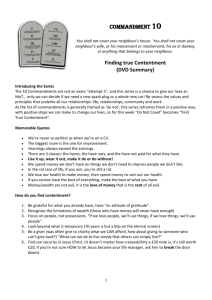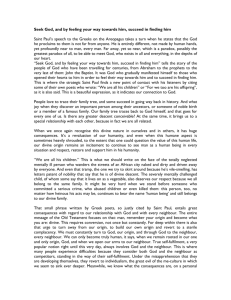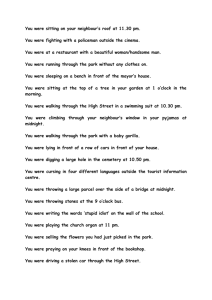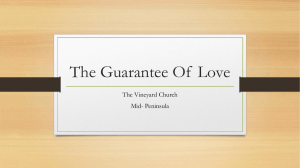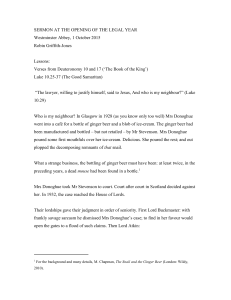THE HUMAN FAMILY AND NATURAL LAW.doc
advertisement
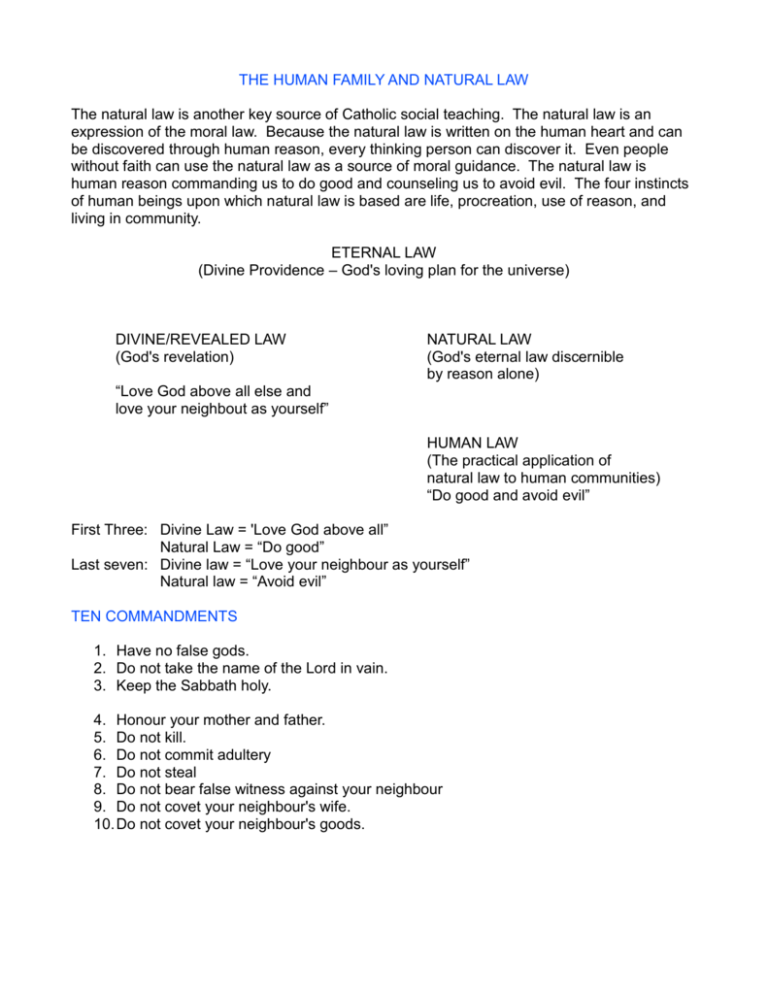
THE HUMAN FAMILY AND NATURAL LAW The natural law is another key source of Catholic social teaching. The natural law is an expression of the moral law. Because the natural law is written on the human heart and can be discovered through human reason, every thinking person can discover it. Even people without faith can use the natural law as a source of moral guidance. The natural law is human reason commanding us to do good and counseling us to avoid evil. The four instincts of human beings upon which natural law is based are life, procreation, use of reason, and living in community. ETERNAL LAW (Divine Providence – God's loving plan for the universe) DIVINE/REVEALED LAW (God's revelation) NATURAL LAW (God's eternal law discernible by reason alone) “Love God above all else and love your neighbout as yourself” HUMAN LAW (The practical application of natural law to human communities) “Do good and avoid evil” First Three: Divine Law = 'Love God above all” Natural Law = “Do good” Last seven: Divine law = “Love your neighbour as yourself” Natural law = “Avoid evil” TEN COMMANDMENTS 1. Have no false gods. 2. Do not take the name of the Lord in vain. 3. Keep the Sabbath holy. 4. Honour your mother and father. 5. Do not kill. 6. Do not commit adultery 7. Do not steal 8. Do not bear false witness against your neighbour 9. Do not covet your neighbour's wife. 10. Do not covet your neighbour's goods. RESPONSIBILITIES OF INDIVIDUALS AND SOCIETY Obligations of individuals 1. Help shape a just, loving, society so it promotes love of God and neighbour. A key way to do this is to live a life of inner conversion so that the individual is a just, loving, moral person. Minimally, be on the alert to root out any laws or practices that cause sin or undermine human dignity. 2. Take special vigilance to see that God's little ones are cared for in society. Support those causes, laws, and institutions that guarantee the rights of the poor in our midst. 3. Treat each person as another self. Exercise the virtue of solidarity by viewing others as members of one family under a loving God. 4. Exercise one's right to participate in society. Everyone has a duty to engage in voluntary and generous social interchange according to one's position, role, talents, and interests. Minimally, one must meet family and work obligations, contribute to the church community, and be involved in public affairs. 5. Respect those who have legitimate positions of authority and obey established laws. As good citizens, pay taxes, exercise the right to vote and defend one's country. Welcome immigrants. Protest, even through civil disobedience, unjust laws that undermine human dignity. SOCIETAL OBLIGATIONS 1. Guarantee the conditions that allow associations and individuals to obtain their due, according to their vocation and nature. 2. Root our any form of social, religious cultural, racial, economic, ethnic, or sexual discrimination that denies people their fundamental human rights. 3. Guarantee the most basic right of all, the right to life. Outlaw unspeakable crimes like abortion, murder, euthanasia, assisted suicide, fetal experimentation. 4. Create a climate where people can participate and contribute to the common good. See to honest, just , and open communication based on truth, freedom, justice, and solidarity. 5. Those who hold public authority must always promote the common good, recognize the sovereignty of the law, promote the principle of subsidiarity and the practice of limited government. Besides certain duties listed above: support and defend the family look out for the needs of the poor and defenseless through distributive justice, guarantee the right of religious freedom, promote peace within and outside the country, see that all have access to the economic and political spheres, ensure a morally fit environment where virtue can thrive, for example, by outlawing pornography. CENTRALITY OF THE FAMILY Society and government have a duty to honour and assist the family and to guarantee basic rights. The Charter of the Rights of the Family presented by Pope John Paul II at the request of the Synod of Bishops spelled out some of these rights: 1. All persons have the right to the free choice of their state of life and thus to marry and establish a family or to remain single. 2. Marriage cannot be contracted except by free and full consent duly expressed by the spouses. 3. The spouses have the inalienable right to found a family. 4. Human life must be respected and protected absolutely from the moment of conception. 5. Since they have conferred life on their children, parents have the original, primary and inalienable right to educate them, hence they must be acknowledge as the first and foremost educators of their children. 6. The family has the right to exist and to progress as a family. 7. Every family has the right to live freely its own domestic religious life under the guidance of the parents, as well as the right to profess publicly and to propagate the faith, to take part in public worship and in freely chosen programs of religious instruction, without suffering discrimination. 8. The family has the right to exercise its social and political function in the construction of society. 9. Families have the right to be able to rely on an adequate family policy on the part of public authorities in the juridical, economic, social and fiscal domains, without any discrimination whatsoever. 10. Families have a right to a social and economic order in which the organization or work permits the members to live together, and does not hinder the unity, well-being, health and the stability of the family, while offering also the possibility of wholesome recreation. 11. The family has the right to decent housing, fitting for family life and commensurate to the number of the members, in a physical environment that provides the basic services for the life of the family and the community. 12. The families of migrants have the right to the same protection as that accorded other families. REFLECTION: You are going to devote yourself to doing “random acts of kindness” around your homes: offering babysitting services free of charge so that their parents can have a “night on the town”, offering to make dinner, do dishes, do extra yard work, etc., to show appreciation to your parents. Write a reflection paper recounting the deeds you did, your parents' responses, and your own feelings about the experience.

